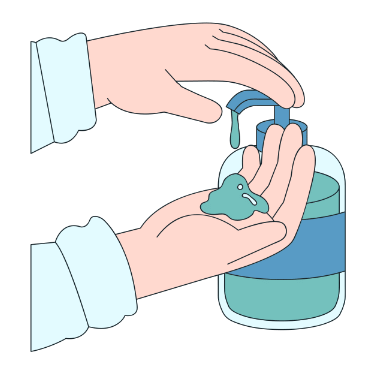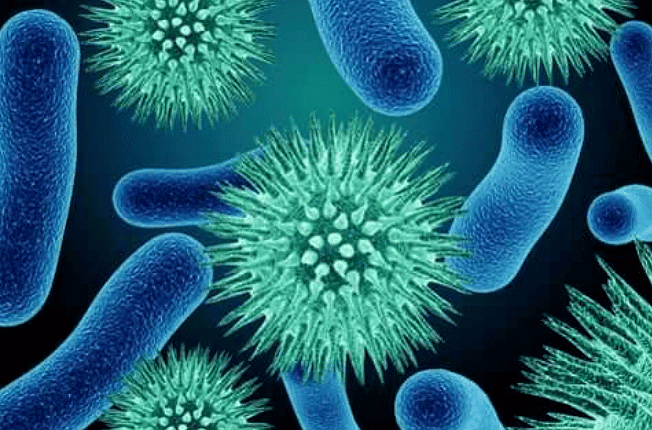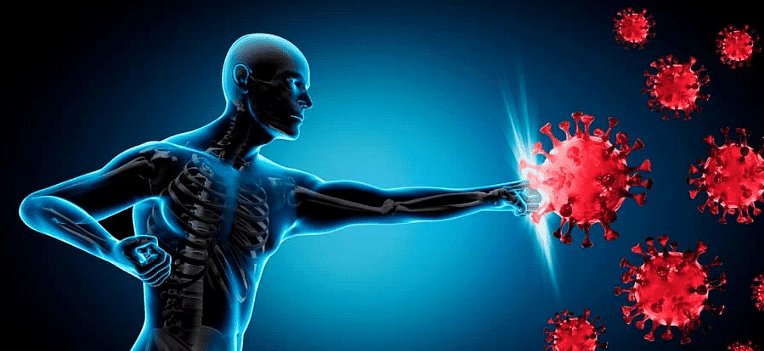Class 4 Exam > Class 4 Notes > Science Olympiad Class 4 > Chapter Notes: Health and Sanitation
Health and Sanitation Chapter Notes | Science Olympiad Class 4 PDF Download
| Table of contents |

|
| Health |

|
| Factors Contributing to Good Health |

|
| Sanitation |

|
| Sanitation Practices |

|
| Understanding Diseases |

|
| Immunity and Allergies |

|
| Food and Nutrition |

|
Health
- Health, according to WHO, means being physically, socially, and mentally well, not just free from sickness.
- It involves looking at wellness as a whole, which includes not only physical health but also mental and social well-being.
Factors Contributing to Good Health
Balanced Diet
- To stay healthy, we need to eat a balanced diet.
- This means eating many different kinds of foods in the right amounts.
- Drinking enough water every day is also really important for our bodies to work well and keep us feeling good.
 Balanced Diet
Balanced Diet
Personal Hygiene
- Personal hygiene involves maintaining cleanliness and adopting healthy habits in daily life.
- This includes practices such as regular handwashing, maintaining oral hygiene, bathing, wearing clean clothes, and ensuring proper sanitation and waste disposal.
Question for Chapter Notes: Health and SanitationTry yourself: What does a balanced diet involve?View Solution
Regular Exercise
- Doing regular physical activities is important for staying healthy and fit.
- Exercise helps keep our weight healthy, makes our heart stronger, makes us feel happier, lowers stress, and makes life better.
- Getting enough rest and sleep is also really important for keeping our bodies and minds healthy.
 Exercise
Exercise
Sanitation
- Sanitation means having ways to get rid of human waste like urine and poop safely (WHO, 2018).
- It's not just about waste; sanitation also means keeping cities clean and hygienic in different ways.
- To make sanitation better, we need to deal with other things like managing trash, handling rainwater, making sure we have clean water, and making toilets available.
- It's all about making sure everything in the sanitation system works well together.
Sanitation Practices
Personal Sanitation
- Keeping clean is important to stop infections from spreading and to stay healthy.
- This means washing our hands a lot, especially before and after eating, after using the toilet, and after touching things that might have germs.
- Also, it's important to brush our teeth, take baths often, wear clean clothes, and drink water that's safe and clean.
 Personal Sanitation
Personal Sanitation
Community Sanitation
- Community sanitation means keeping shared places clean to stop diseases from spreading in our neighborhoods.
- It involves things like handling garbage properly, cleaning up public areas, making sure surfaces are disinfected, and stopping bugs and pests from making homes nearby.
Question for Chapter Notes: Health and SanitationTry yourself: Which of the following factors can cause non-infectious diseases?View Solution
Understanding Diseases
Definition of Disease
- Diseases are different kinds of problems that can make our bodies work in strange ways and make us feel sick.
- They can happen because of things like tiny germs such as bacteria, viruses, fungi, protozoa, and parasites.
- Other reasons for diseases include things around us, like our genes, how we live, and what's in our environment.
Types of Diseases
- Diseases are put into two groups: infectious and non-infectious, based on what causes them.
- Infectious diseases come from tiny things called pathogens and can spread from one person to another or from things in the environment.
- Non-infectious diseases happen because of things like genes we inherit, how we live, what's around us, or other health problems we might have.
 Pathogens
Pathogens
Common Infectious Diseases
- Infectious diseases are sicknesses caused by tiny germs called pathogens.
- These include viral infections, like the common cold, bacterial infections such as typhoid and cholera, fungal infections like ringworm, diseases caused by protozoa such as malaria, and helminthic infections like filariasis.
Immunity and Allergies
Immunity
- Immunity means our body's way of fighting off germs and other things that might make us sick.
- There are two kinds of immunity: one we are born with (innate immunity) and one we build up over time (acquired immunity).
- Both types of immunity team up to keep us safe from infections and keep us healthy.
 Immunity
Immunity
Allergy
- Allergies happen when our immune system reacts too much to certain things in the environment.
- These things, called allergens, can be pollen, dust mites, pet fur, certain foods, or insect stings.
- Allergic reactions can be mild, like sneezing and itching, or really serious, like anaphylaxis, which can be life-threatening if we don't get help quickly.
Question for Chapter Notes: Health and SanitationTry yourself: What is the primary source of energy for the body?View Solution
Food and Nutrition
Source of Food
- Food is what gives us the stuff our bodies need to stay healthy and work right.
- We get food from plants and animals, and it gives us important things called macronutrients (carbs, proteins, and fats) and micronutrients (vitamins and minerals) that we need to be really healthy.
Components of Food
- A balanced diet includes carbohydrates, fats, proteins, vitamins, and minerals.
- Carbohydrates give our body its main energy.
- Fats store a lot of energy and have important fatty acids our body needs.
- Proteins help fix tissues, make muscles grow, and keep our immune system strong.
- Vitamins and minerals do different jobs in our body to help it work well and keep us healthy.
Knowing and using ideas about staying healthy, keeping clean, preventing sickness, having a strong immune system, and eating right are really important.
They help make sure people and communities stay well and don't get too sick.
The document Health and Sanitation Chapter Notes | Science Olympiad Class 4 is a part of the Class 4 Course Science Olympiad Class 4.
All you need of Class 4 at this link: Class 4
|
52 videos|70 docs|53 tests
|
FAQs on Health and Sanitation Chapter Notes - Science Olympiad Class 4
| 1. What are some factors contributing to good health? |  |
Ans. Factors contributing to good health include sanitation practices, understanding diseases, immunity and allergies, and proper food and nutrition.
| 2. Why is sanitation important for good health? |  |
Ans. Sanitation is important for good health as it helps prevent the spread of diseases by maintaining cleanliness and hygiene in our surroundings.
| 3. How can understanding diseases help in maintaining good health? |  |
Ans. Understanding diseases can help in maintaining good health by recognizing symptoms early, seeking appropriate medical care, and taking preventive measures to avoid contracting illnesses.
| 4. How does immunity play a role in our overall health? |  |
Ans. Immunity plays a crucial role in our overall health by protecting our bodies from harmful pathogens and infections, helping us stay healthy and recover faster from illnesses.
| 5. What role does food and nutrition play in maintaining good health? |  |
Ans. Food and nutrition play a vital role in maintaining good health by providing essential nutrients, vitamins, and minerals that support our immune system and overall well-being.
Related Searches




















